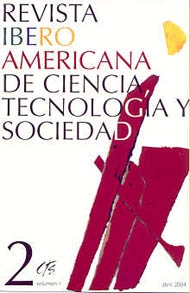The STS Field in Latin America and the Social Use of Its Output
DOI:
https://doi.org/10.52712/issn.1850-0013-1079Abstract
In a recent publication, Susan Cozzens (2001) called for a return to a more “social movement” character within the Science, Technology and Society (STS) field — more generalist and interdisciplinary in its intellectual dimension, and more interventionist in society. We know that the movement-based nature of STS was one of the foundational matrices of the field. The same can be said about Latin America, though here the political issues of the social movement did not focus on criticizing the consequences of technology, but rather on challenging a model of technology policy that was contrary to the region’s development needs (see R. Dagnino, H. Thomas & A. Davyt, 1996; and L. Vaccarezza, 1998).
Downloads
References
ALBORNOZ, Mario (1996): “La ciencia política ignora a la política de la ciencia”, en M. Albornoz, P. Kreimer y E. Glavich (ed.), Ciencia y Sociedad en América Latina, Bernal, Universidad Nacional de Quilmes.
BRUNNER, J.; SUNKEL, G. (1993): Conocimiento, sociedad y política, Santiago de Chile, FLACSO.
COZZENS, Suzans (2001), “Making Disciplines Disappear in STS”, en S.H.Cutcliffe and C.Mitcham (ed.), Visions of STS: Counterpoints in Science, Technology and Society Studies, Albany: State University of N.York Press, pp. 51-67.
DAGNINO, R.; THOMAS H. y DAVYT. A. (1996): “El pensamiento en ciencia, tecnología y sociedad en Latinoamérica: una interpretación política de su trayectoria”, en REDES, vol. 3, nro. 7, Buenos Aires, pp. 13-52.
VACCAREZZA, L (1998): “Ciencia, Tecnología y Sociedad: el estado de la cuestión en América Latina”, en Revista Iberoamericana de Educación, Número 18, septiembre-diciembre, Madrid, OEI, pp. 13-40.
WINNER, L. (2001): “Where Technological Determinism Went?”, en S.H.Cutcliffe and C. Mitcham (ed.), Visions of STS: counterpoints in Science, Technology and Society Studies, New York, State University of New York Press.
Downloads
Published
How to Cite
Issue
Section
License
Copyright (c) 2025 CC Attribution 4.0

This work is licensed under a Creative Commons Attribution 4.0 International License.
All CTS's issues and academic articles are under a CC-BY license.
Since 2007, CTS has provided open and free access to all its contents, including the complete archive of its quarterly edition and the different products presented in its electronic platform. This decision is based on the belief that offering free access to published materials helps to build a greater and better exchange of knowledge.
In turn, for the quarterly edition, CTS allows institutional and thematic repositories, as well as personal web pages, to self-archive articles in their post-print or editorial version, immediately after the publication of the final version of each issue and under the condition that a link to the original source will be incorporated into the self-archive.











